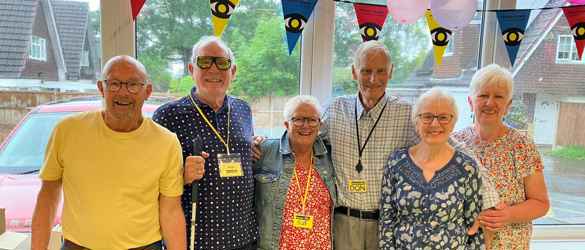
Daily living skills
Advice, hints and tips on managing daily life with macular disease. Many of these tips are from our members – they are the experts on living with macular disease.
There is a lot of support available for you if you have macular disease.
Remember, even if you cannot be treated for your macular condition, you will not lose all your sight. Peripheral vision is not affected. People with macular conditions often find things take longer than before but, by learning new techniques, they can manage very well.
In the home
- Make the lighting in your home bright and even. People with a macular condition may be more sensitive to glare so make sure the brightness of your lighting is not causing discomfort. Use task lighting to highlight what you are working on. Plain, pale decor reflects light into the room. Often, improving lighting and reducing glare is enough. See our Lighting page for more detail.
- Make the most of aids like non-slip mats, reading stands and magnifiers.
- Use ‘talking’ equipment such as microwaves, watches, scales, and timers.
- Large face clocks, watches and mobile phones can be easier to see.
- Books, newspapers and magazines are available in large print or audio formats.
- Adjusting your distance to the TV or making sure you have a TV set suitable for your vision might help improve your viewing.
- In Touch is a BBC Radio 4 programme. It features items on many aspects of dealing with sight loss including benefits, new treatments and special events. Tune in every Tuesday at 8.40pm. Also available on iPlayer or as a podcast.
Use task lighting and contrasting colour in the kitchen
Use big, bright, bold and contrasting colours to make it easier to differentiate items. For example:
- Paint window and door frames a different colour from the walls, or walls a different colour to floors.
- Use different coloured chopping boards for different food types.
- Use brightly coloured glasses or cups when making a drink.
- Wrap brightly coloured tape around the handles of utensils and tools to make them easier to find.
- Use raised coloured stickers to mark the most used setting on appliances like the oven and washing machine, a keyhole or the buttons on the radio. These bump-on stickers are widely available from organisations such as the RNIB or the Partially Sighted Society.
- Use a liquid level indicator when pouring drinks and put the cups on a tray to contain spills.
- An easy way to tell which is the shampoo bottle and which is the conditioner is to put an elastic band round one of them.
- Use a clothes peg to keep your shoes in pairs. It makes wearing odd shoes less likely.
- Use a black medium fibre tip pen to help you read back your own writing. Continue to write in upper and lower case as opposed to only in capital letters.
- A writing frame can help keep lines of writing straight and a signature guide helps when signing documents.
Writing frame
- Keep a pocket dictation machine instead of a paper and pen by the telephone to make it easier to take messages.
- Technology such as e-readers, smart phones and tablets often come with apps or software that will help you to access information. Large keyboards and audio software can help you make the most of your computer.
Out and about
- Consider carrying a symbol cane. This is a short, white, folding stick which indicates that you have a visual impairment.
- In general, telling people you have a visual impairment because of macular disease can help them understand more about it and can make your life easier. For example, people with macular disease often worry that they will accidentally walk past friends without recognising them, perhaps upsetting them. Letting people know will help avoid misunderstandings.
- There are ways to tell when it’s safe to cross the road at a pedestrian crossing. Some crossings make a bleeping noise. Others have a small cone-shaped bump under the control button box that spins when it’s safe to cross. Others have a vibrating plate under the control box.
- You don’t automatically have to stop driving if you have a macular condition. However, if you are diagnosed with it in both eyes you must inform the DVLA and your insurance company. If you need to stop driving and are registered as sight-impaired you may be entitled to travel discounts. For more information about driving, please see our Driving page.
For more information about getting out and about, see our Out and about webpage.
Video: Simple kit to make life easier by Pat McGeough
Support and rehabilitation
Sometimes you need more than just everyday tips. There are many services offering advice tailored to your personal needs and many people with macular disease tell us they’ve found them really useful.
Health services
ECLOs
Some eye clinics have an Eye Clinic Liaison Officer (ECLO) or similar role. They work with people coming to terms with sight loss and their family or friends who also need to adjust to this change.
ECLOs can give invaluable advice on all matters relating to sight loss, from information about your condition to helping you identify support services to suit you.
Low vision assessment
It is a good idea to have a low vision assessment. A low vision assessment will help you decide if things like optical magnifiers will be of use to you.
Low vision clinics are normally based in hospitals, but they can also be found in opticians or local societies for the visually impaired.
Ask your consultant/ ophthalmologist or GP to refer you to a low vision service for an assessment.
Sensory Services
Sensory teams are part of your local council’s Adult Services. They specialise in helping people with sight loss and/or hearing loss to remain independent and safe. They may have a Rehabilitation Officer of Visual Impairment (ROVI) visit you at home to assess your individual needs and can advise you about benefits, lighting and low vision equipment as well as provide practical tips on how to take care of your appearance, prepare food and take medicines.
They can also suggest techniques to help you get around out of the home and discuss the possibilities of mobility aids such as a long cane or a guide dog.
How we can help
Macular disease is the biggest cause of sight loss in the UK, with around 300 people diagnosed every day.
It steals your sight, your confidence, and your ability to do the things you love.
There is only one way to Beat Macular Disease for good. We must fund much more research now, until we find a cure, or find treatments that stop it in its tracks. To support people affected by macular disease now, the Macular Society provides a range of support, information and services:
The Macular Society Helpline (0300 3030 111) is available Monday to Friday, 9am to 5pm if you have any questions about any of the information on our website. Alternatively you can email help@macularsociety.org.
Free confidential advice and support
Call our helpline on 0300 3030 111
Lines are open 9am - 5pm Monday to Friday
About the Macular Society HelplineOur network of over 400 Macular Society Support Groups stretches across the UK. Each one offers practical and emotional support for people with macular disease, from those living with it today.
We provide a confidential Counselling Service over the phone. Call the Advice and Information Service for more information.
Want more information about how you can make daily life easier?
Call the Macular Society Helpline on 0300 3030 111 or email help@macularsociety.org
Last review date: March 2022
Around the home
Feel more independent in your home with our practical guides to everyday activities such as preparing meals, personal care, using technology and more.
Out and about
Live confidently with our practical guides to getting out and about, from traveling and transport to eating out and shopping.
Local support groups
Our support groups are for people of working age and older, and provide information, support and friendship to people with macular disease and sight loss. Find your local support group today.
Support for you
We provide free information and support to those with macular disease, along with their family and friends, to help people keep their independence.
Get the latest news and advice from the Macular Society
To hear about life-changing research, treatments and tips for living with sight loss, subscribe to our monthly enewsletter today. Together we can Beat Macular Disease.
Sign up to our free email newsletter





